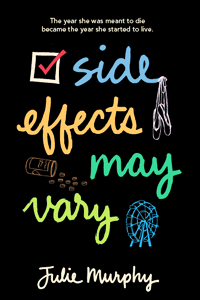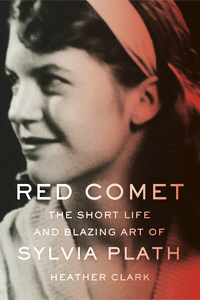Title Side Effects May Vary
Author Julie Murphy
Published March 18th, 2014 by HarperCollins / Balzer + Bray
Pages 336 Pages
Intended Target Audience Young Adult
Genre & Keywords Contemporary, Realistic Fiction, Cancer, Romance
Part of a Series? No
Source & Format Received an Advanced Reader Copy from the publisher for review (Thanks, HarperTeen!), eBook
Find It On Goodreads ● Amazon.com ● Chapters

What if you’d been living your life as if you were dying — only to find out that you had your whole future ahead of you?
When sixteen-year-old Alice is diagnosed with leukemia, her prognosis is grim. To maximize the time she does have, she vows to spend her final months righting wrongs — however she sees fit. She convinces her friend Harvey, whom she knows has always had feelings for her, to help her with a crazy bucket list that’s as much about revenge (humiliating her ex-boyfriend and getting back at her arch nemesis) as it is about hope (doing something unexpectedly kind for a stranger and reliving some childhood memories). But just when Alice’s scores are settled, she goes into remission.
Now Alice is forced to face the consequences of all that she’s said and done, as well as her true feelings for Harvey. But has she done irreparable damage to the people around her, and to the one person who matters most?

“Dr. Meredith took a deep breathe. “Alice.” His brown eyes found mine, and it was only me and him. He exhaled. “You’re in remission.”
For a moment, it was quiet and everything felt okay. But then my mother began to sob, her entire body shaking in response. It was a horrible noise that made the room feel too small. Dad coughed, trying to bite back his tears. He pinched the bridge of his nose, like his fingers might absorb his tears, but instead they rolled down his hand and into the cuff of his jacket.
Oh, shit.
This, I did not expect. This was not on my list.”
What would you do if you only had a limited time left to live? For most, this is a theoretical question one will ponder idly at some point in their lives but never give any serious thought to. For Alice Richardson, however, this is an all-too-serious and devastating reality. Diagnosed with Leukemia at the tender age of fifteen, Alice is quickly forced to face the harsh reality of her dwindling mortality. Believing she only has a few months left to live, Alice devises a bucket list, a list of things she must accomplish before she passes on. You will find nothing so benign or trite as ‘swim with dolphins’ or ‘backpack across Europe’ on this bucket list, however. Oh, no. Instead, Alice’s impending death allows her to shed her inhibitions and find a new lease on life as she seeks retribution for wrongs perpetrated against her. Revenge against Luke, for example, her former boyfriend, who cheated on Alice throughout their relationship and shared her family’s deepest, darkest secret with her worst enemy. Or against Celeste, her former friend, for whom everything is a competition and no line is too sacred to cross. In a cruel twist of fate, however, it is not until after Alice has gotten her revenge and resigned herself to death that her body decides to fight back. Much to everyone’s surprise, no sooner have Alice and her family given up on treatment and begun to count down their last days together than she is informed she’s in remission. But as the doctor uses terms like ‘medical miracle’ and her parents appear to see her and not the disease for the first time since her diagnosis, Alice is anything but happy or relieved. Now, as Alice grapples with the fact that there is, in fact, life after (almost certain) death and is forced to face the consequences of all she has done in the wake of her diagnosis, she will find that the most difficult thing to do is not to die in this world, but to live in it.
“But then again, the cancer could always come back. In a deep corner of myself that scared even me, I thought that maybe if the cancer did come back, it might not be so bad. I knew how to die. It was the living that scared me.”
In the interest of full disclosure, I must admit that I approached this novel with a great deal of skepticism and caution. In fact, I had absolutely no intention of reading it at all until a glowing review and recommendation from a friend (thankfully) convinced me otherwise. Having spent my formative years reading the work of Lurlene McDaniel, who I now suspect was under contractual obligation to include at least one character who was suffering from a chronic or terminal illness in every one of her books, I’ve since grown wary of novels that include this sort of storyline. This, coupled with the loss of my own grandfather to cancer, has meant that I’ve avoided novels that feature this and other terminal illnesses at all costs. At least, that was the case until Julie Murphy’s Side Effects May Vary. Thankfully, my friend Ginger over at GReads! read this novel not long after I had dismissed it and was quick to change my mind. After a bit of convincing from a blogger whose opinions I always trust, I decided to take a chance on this 2014 debut, and I couldn’t be happier that I did. Thanks, Ginger – I owe you one! Julie Murphy’s Side Effects May Vary is a courageous, unique, unforgettable novel that reads not like a debut, but a new installment from a seasoned professional. Evocative, powerful, and unapologetic, Side Effects May Vary is a story that teaches readers the often difficult but important lessons of compassion and empathy and will leave you thinking long after you’ve turned the final page.
“I laughed. We were so different. Harvey wanted good. He wanted to leave the ones he loved in a good place. I’d just wanted the last word. But I wouldn’t be sorry for that now. It was too late for sorry.”
Over the last two weeks or so there has been an interesting (and much-needed) dialogue occurring over at Stacked. In a series entitled ‘About The Girls’ there have been a number of articles examining the role of ‘unlikeable’ female characters in fiction, particularly in young adult literature. While I would recommend reading through this entire series as a whole, I particularly recommend the articles ‘Challenging The Expectation of YA Characters as ‘Role Models’ For Girls’ by Sarah Ockler, ‘Some Girls Are Not Okay, And That’s Not Fine’ by Elizabeth Scott and ‘I Love ‘Unlikeable’, I Write ‘Unlikeable’ and I am ‘Unlikeable’ by Justina Ireland. There seems to be an unspoken expectation that characters, particularly female ones, owe us something, as though they need to earn our sympathy and respect in order for us to properly invest in their stories. We expect them to win our affections and act in an unrealistic, idealized manner we would never expect of ourselves or those around us. I mention all of this because the protagonist in this particular story, Alice Richardson, has become a contentious figure amongst readers and is not necessarily what one might consider traditionally ‘likable’. There are times when she’s manipulative. Insensitive. Angry. Selfish. Vengeful. Cruel. In short? She’s a flawed, imperfect human being. Many readers will (and have) argued that their perception of Alice, be it positive or negative, directly effected their overall ability to enjoy Side Effects May Vary as a whole. Thankfully this was not an issue I grappled with.
“Now everything felt wrong, and nothing was the same. My parents and school. Harvey and us. Natalie and ballet. All these plans and all I had to work with was a big, fat question mark. Even though cancer was the hulking monster in the closet, it wasn’t a relapse I was concerned about. Lying there in the dark with the creaking sounds of my house settling, I saw what only ever haunted me in those moments when my body was asleep and my head was still wide awake. The unknown. It consumed me.”
Admittedly, character ‘likeability’ has never been a particular concern for me. As long as a character’s motivations and behaviour are realistic and authentic for their particular circumstances, I won’t quibble about the result, be it palatable or otherwise. But, even if this were an issue for me, I have a shameful confession to make: I liked Alice. Yes, really. Did I always agree with or condone how she behaved? Certainly not. But I understood it. It should go without saying that just because a person does disagreeable or ‘bad’ things does not necessarily make them a bad person. At the tender age of fifteen, Alice is unequipped to deal with the life-altering news of her diagnosis. In this and other respects, Side Effects May Vary is not your typical ‘cancer story’, populated by afflicted characters who are filled with calm acceptance, grace and emotional maturity far beyond their years (or any reasonable credibility). Instead, upon hearing her diagnosis, Alice is angry, bitter and resentful, and deservedly so. Her life and entire future is immediately called into question. As a result, having had the very foundation of her life shaken by the news of her diagnosis and corresponding, almost-certain death sentence, Alice can’t allow herself to trust in the permanence of anything. Even the best of news is laced with a razor-sharp edge of distrust and trepidation. What if the cancer returns? What if her mother’s secret is revealed? What if her fledgling romantic relationship with Harvey doesn’t work out. What if? Rather than confront these issues head-on, it’s easier to deflect, deny, and to lie. To accept the kisses of a stranger who is nothing more than a passing, unemotional distraction. To keep her mother’s secret and repress the feelings of betrayal and resentment that continue to eat away at her. Murphy’s unwavering commitment to candor and realism in respect to Alice’s emotional and physiological journey is as appreciated as it is powerful.
“I knew I would never travel through space or fly a plane, but sitting there with the girl I loved – there was no question about me loving her – and two of my oldest friends, the whole universe spinning around me, reminded me how big this world was and how small we were. In a hundred years, no one would know us, but this moment for us would last as long as we did. This. Right now, with traces of Alice colouring my view of the sky, would never be in a history book or a movie, but for as long as I could push air in and out of my chest, I would remember this moment that could never be measured.”
Told from the alternating perspectives of both Alice and Harvey, Side Effects May Vary further sets itself apart from its contemporary counterparts by also dividing these vantage points up into two separate timelines: Before (during which Alice was diagnosed and suffering from Leukemia) and After (after which Alice has gone into remission). While some readers have reported difficulty following this narrative technique with any coherency, I had absolutely no trouble differentiating between Alice and Harvey’s voices or understanding at what point the passages were taking place. Granted, I’ve always responded well to novels told from a dual perspective as I feel it gives a more complete understanding of the story being told, but I particularly liked it in this case as I felt the vast differences in Alice and Harvey’s perspective played off of one another very well. Seeing the same event from two vastly different points of view allowed me to become more emotionally invested in the story as I was immediately drawn into the conflict and had the desperate desire to smooth out the (many) wrinkles in Alice and Harvey’s relationship. Although I won’t delve too deeply into it for fear of spoilers, I also appreciated the ambiguity regarding the ending of the story, particularly in regard to Alice and Harvey’s relationship. As Murphy demonstrates throughout Side Effects May Vary, life is messy, complicated and hard, and there are no easy answers or clear-cut conclusions. The fact that the characters’ fate is left open to the reader’s imagination also felt particularly fitting given the air of uncertainty and impermanence that was a constant fixture in Alice’s life. Narrative structure aside, Murphy’s prose is a thing of beauty. At times raw and brash, at others delicate and understated, I continually marvelled at the fact that Side Effects May Vary is not, as one would assume after reading it, the third or fourth novel from a seasoned author, but a literary debut. I can only imagine (and eagerly await) the author’s next novel to see how her craft evolves from here.
“I wanted to be that person for all of them – the person they’d painted into their memory, the memorialized version of Alice – but that girl wasn’t me. And that scared me. As it turned out, my greatest fear in life had become expectations.”
Bold, brash and refreshingly unique, in Side Effects May Vary Julie Murphy has written a prescription for readers searching for intricate, innovative stories with complex characterization and challenging subject matter that will inspire a powerful emotional response and remain with you long after you turn the final page. Move over, John Green! Julie Murphy has proven herself to be a daring new voice in the young adult market, and, in a single volume has won me over with her wit, vivacity, and candor. Now all I can do is anxiously await her second novel, Dumplin, which is set to be published in 2015. Question: How many times can I re-read Side Effects May Vary before then without being classified as certifiably insane? I’m asking for a friend.
Please Note: All quotations included in this review have been taken from an advanced reader copy and therefore might be subject to change.

Overall Rating



Still not sure this is the right book for you? Why not listen to what some other bloggers had to say about it?
● Ginger @ GReads! wrote “This story is rich with emotion and consequences, flooded with humor and wit. Side Effects May Vary encompasses a lot of what makes contemporary YA so compelling for this adult reader. (Read the rest of the review Here!)
● Jenna @ Jenna Does Books wrote “Unfortunately, Alice was just too mean – too unlikable – for me to forgive her for anything. And that is what had the biggest impact on my overall enjoyment (or lack thereof) of this novel.” (Read the rest of the review Here!)
● Liz @ Consumed By Books wrote “I would tell you that Murphy’s book is a standout debut, but it is a standout. Period.” (Read the rest of the review Here!)












11 Responses
I think this one will hit too close to home for me, but your review was fabulous
Paij Slater recently posted…HUSH by Stacey R. Campbell – Review
Thank you so much, Paij 🙂 I completely understand how you feel – I tend to avoid stories of this nature because of my family’s own history with cancer as well. It’s important to know what type of stories we should read and/or avoid given our personal histories.
Jen @ Pop! Goes The Reader recently posted…Review: Side Effects May Vary by Julie Murphy
I’ve been debating reading this one. I’ve also had family suffer from cancer, so I’m always wary of those types of books in general, although I do read them from time to time. But I am someone who needs to like the main character (whether it’s a girl or boy). I’m not saying the the character needs to be perfect, but I don’t want to spend a lot of time with someone who I don’t like.
I understand where a lot of people come from about likable girl characters in books, but I can’t change the way I am. And it isn’t just girl characters, for me. I need to like the main character whether it’s a girl of guy.
But I’m glad you liked this one. I will have to look into it.
Quinn @ Quinn’s Book Nook recently posted…Review: The Goddess Test by Aimee Carter
Hey, to each their own, Quinn! I know that character likeability is an important factor for a number of readers. All that matters is that you read a story that will make you happy!
Jen @ Pop! Goes The Reader recently posted…Review: Side Effects May Vary by Julie Murphy
This is why I love reading. I love that I am able to convince someone to give a book a chance, and in turn they end up loving it. It’s one of the greatest feelings. So thrilled that you enjoyed this one, Jen, and appreciate the story as much as I do.
Ginger @ GReads! recently posted…GReads! Interrupted: Jumping Into Springtime
Thank you so much again for convincing me to step outside of my comfort zone and read this one. Hearing your talk about it on Twitter made me endlessly curious and as nervous as I was beforehand, the risk was well worth it in the end. It’s certainly a new favourite and I’ve already purchased a finished copy 🙂 Being exposed to books I might not otherwise read is definitely one of my favourite aspects of blogging.
Jen @ Pop! Goes The Reader recently posted…Review: Side Effects May Vary by Julie Murphy
I’ve read too many reviews dismissing this book because Alice was unlikable, and it has been rubbing me the wrong way. I don’t think any of us are perfect so I’m not sure why we want our characters to make perfect decisions. It just doesn’t make sense to me. Yes, I did relate more to Harvey but I also GOT Alice. Even if she wasn’t making the decisions I would have, or making decisions based on her true feelings. I know a lot of people like this, so maybe it’s why I was more open to it? I have no idea. But I appreciate that you gave this book a second chance, and that you wrote about it so well. And, most importantly, I hope more people pick it up because of everything you said.
Estelle recently posted…Estelle: The Geography of You and Me by Jen E. Smith
THIS!
Ginger @ GReads! recently posted…GReads! Interrupted: Jumping Into Springtime
I’ve read too many reviews dismissing this book because Alice was unlikable, and it has been rubbing me the wrong way.
I feel the exact same way, Estelle! It’s one thing to dislike a book because you personally had a negative experience – To each their own! But to be unwilling to give a book a chance simply because of another’s opinion seems unfair, especially when it comes to character ‘likeability’, which has proven to be such a divisive and personal issue. As you said, I just hope that my review has convinced one reader to give Side Effects May Vary a chance. That’s all you can really ask for.
Jen @ Pop! Goes The Reader recently posted…Review: Side Effects May Vary by Julie Murphy
You captured nearly perfectly what I liked best about Side Effects May Vary, Jen! I really think that it’s not going to resonate with every single reader. But for the ones that do wind up liking it, it’s definitely because it’s a unique, out of the box sort of story!
Alexa S. recently posted…Side Effects May Vary – Julie Murphy (Review)
Oh my goodness. Thank you so much, Alexa! That means so much given how much I respect your blog and your reviews 🙂
I completely agree – Side Effects May Vary won’t be the right book for everyone, but I would rather a book step outside of the box, take a risk and evoke a passionate response, be it positive or negative, rather than towing the line and not leaving any distinctive impression at all.
Jen @ Pop! Goes The Reader recently posted…Review: Side Effects May Vary by Julie Murphy